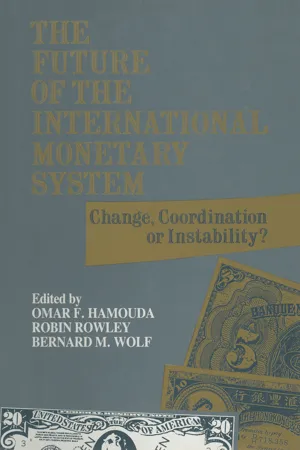Economic Instability
Economic instability refers to a situation where an economy experiences unpredictable fluctuations, such as recessions, inflation, or currency devaluation. This can lead to uncertainty for businesses and consumers, impacting investment, employment, and overall economic growth. Factors contributing to economic instability may include political unrest, natural disasters, or financial market volatility.
3 Key excerpts on "Economic Instability"
- eBook - ePub
Can It Happen Again?
Essays on Instability and Finance
- Hyman Minsky(Author)
- 2016(Publication Date)
- Routledge(Publisher)
...A special type of uncertainty is inherent in an enterprise system with decentralized decisions and private ownership of productive resources due to the financial relations. The financial system of such an economy partitions and distributes uncertainty. A model that recognizes the problems involved in decision-making in the face of the intrinsically irrational fact of uncertainty is needed if financial instability is to be understood. A reinterpretation of Keynesian economics as just such a model, and an examination of how monetary constraint—whether due to policy or to behavior of the economy—works, are needed before the stability properties of the financial system and thus of the economy can be examined. It turns out that the fundamental instability of a capitalist economy is a tendency to explode—to enter into a boom or “euphoric” state. This paper will not present any empirical research. There is, nevertheless, need to: (1) examine updated information of the type analyzed in earlier studies, (2) explore additional bodies of data, and (3) generate new data. Only with this information can the problem be made precise and the propositions tested. There is a special facet to empirical work on the problems at issue. Financial crises, panics, and instability are rare events with short durations. 5 We have not experienced anything more than unit or minor sectoral financial distress since the early 1930s. The institutions and usages in finance, due to both legislation and the evolution of financial practices, are much different today from what they were before the Great Depression...
- eBook - ePub
Essays
On Entrepreneurs, Innovations, Business Cycles and the Evolution of Capitalism
- Joseph A. Schumpeter(Author)
- 2017(Publication Date)
- Routledge(Publisher)
...Looking, for instance, at France, with her stationary population and enterprise and her vast colonial empire, and at the opposite state of things in Italy, the observer may well have an impression of instability — let us call it, “political” instability — which, however, has nothing to do with Economic Instability in our sense; for in the economic systems of these countries there might still be perfect stability. Or if we assume a state of things in which the whole of the industry of a country is monopolised by one single firm, we should probably agree in calling such a system unstable in a very obvious sense — let us label the case as one of “social instability” — whilst it could be highly stable economically. Instability in still another sense would obtain in a system, for which equilibrium wages were at a point below what workers will put up with — although there need not be any tendency in the economic conditions themselves to produce any change at all by the mere working of the system. Finally, special cases of instability may arise from particular influences from without, whiph cannot properly be charged to the economic system at all. England’s return to the gold standard is a case in point. “Stabilising” the pound at what was, viewed from the standpoint of existing conditions, an artificial value, naturally meant dislocating business, putting a premium on imports and a tax on exports, intensifying losses and unemployment, thereby creating a situation eminently unstable. But this instability is evidently due to the act of politicians, and not to the working of the system which, on the contrary, would have evolved a value of the pound exactly fitting the circumstances. In short, the economic stability we mean, although it contributes to stability in other senses, is not synonymous with them, nor does it imply them...
- eBook - ePub
The Future of the International Monetary System
Change, Coordination of Instability?
- Omar F. Hamouda, Robin Rowley, Bernard M. Wolf(Authors)
- 2016(Publication Date)
- Routledge(Publisher)
...1 Disturbance in the world economy Robin Rowley and Omar Hamouda Crises are not rare occurrences in the world economy. We can readily point to major problems of excessive debt, financial fragility, exchange-rate volatility, extraordinary levels of governmental and international deficits, commodity imbalances and inadequate political leadership - all present with marked severity during the last decade. Diligence in searching the historical record may demonstrate that such disturbed conditions were experienced in irregular instances throughout the life of capitalistic production and exchange. However, the present incidence of debt, lack of hegemonic leadership and fragility of the international monetary system (perhaps, of banking and stock markets too) are special. We have moved into a phase of crisis rather than one of modest disturbances to the world economy. Even the powerful elite of the IMS have recognized some need for corrective actions although considerable doubts persist as to what these should entail – primarily because of the ideological pressures of familiar beliefs and, to some extent, because of plain ignorance or fear. Few economists and politicians presume that the present crisis must lead to an extensive collapse of the world economy but most of them are gradually acknowledging the hazards of the situation in which we find ourselves. Almost no one anticipates that these hazards will be expeditiously resolved either by the individual acts of the principal players on the international scene or by their collaborative efforts...


